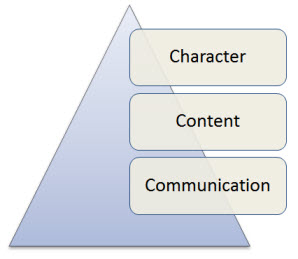Source of article Jury Insights.
Advanced Witness Preparation
Challenging Personality Traits
Part 1
Identifying Challenging Personality Traits
Recently, I have sent a four segment series of posts regarding the basics of witness preparation, which you may also find at this web-blog.
These earlier posts dealt primarily with performance or communication type issues. In actual practice, however, performance is the last step of my approach to witness preparation. Hierarchically, before managing communication, the attorney should manage character and content issues.
THE THREE C’S IN THE
HIERARCHY OF WITNESS PREPARATION

(1) Manage Characterological Emotional-Behavioral Issues
(2) Manage Strategic Content
(3) Manage Performance Communication
In this post, I will just deal with identifying the characterological features of difficult to work with clients and witnesses. In a later post, I will recommend some ways to work with them.
Fields of Law with Higher Frequency of Challenging Clients
Litigants are prone to have some difficulties with emotional stability–some, a great deal more than others. For example, attorneys who work in criminal defense law, family law and plaintiff side personal injury law or employment law may experience a greater number of these clients.
Why do people behave this way?
While there are probably biological or neuro-psychological components, for the purposes of this discussion, let’s just say that during childhood we all develop “skills” to regulate our emotions in response to actual or perceived threats to our well-being. Sometimes, these skills solve problems for us in the short term, but may create problems for us in the long term.
It is as if we learned to use a “hammer” to hit a nail in early life, it worked to some extent, and then we later saw future life problems as the same nail requiring the same hammer. Unfortunately the coping skills may now have become maladaptive.
During life most of us develop increased ability to raise the threshold at which we perceive threat, and the ability to use a wider range of skills to respond to and regulate intense emotions.
The challenging client, however, easily becomes emotionally overwhelmed, leading to a kind of me-centered desperation, losing perspective and understanding. This client may become a challenge to like and may become the object of your hate, anger or pity.
A Challenge to Empathy
In order to work successfully with difficult, challenging personalities, you must first be capable of having empathy for these clients and not react with judgment, frustration, condescension or outright retaliatory anger. To say it a little differently, you need to make sure that you do not respond to the client’s set of maladaptive responses with a set of your own.
Recognizing Emotional Instability
After spending some time with a challenging client, you may start to recognize that your client has strange reactions or behaviors; the behavior will tend to fall into two general categories:
HIGH CONFLICT:
These are clients who tend to become over-engaged and highly provocative, with a potential for impulsive acting out in anger towards opposing counsel/client as well as you.
LOW CONFLICT:
Under-engaged, conflict averse and docile.
These are clients who tend to be under-engaged, conflict averse or docile, and may appear to care less about the litigation than you do.
Of the two groups, the High Conflict clients tend to be more dangerous to the overall litigation and to the attorney.
Bill Eddy, an attorney who also has a social work background, has addressed the subject of “High Conflict” clients very thoroughly, and I would recommend that you pick up one or more of his books. I heard about Mr. Eddy from an attorney who attended his CLE in Seattle and I have incorporated several of Mr. Eddy’s conceptualizations in this post.

Almost everyone is familiar with psychiatric terminology related to dysfunctional personalities, such as narcissist, sociopath, paranoid, histrionic, borderline, avoidant, dependent and obsessive-compulsive.
A witness does not need to have a diagnosable character disorder to become a challenging person with whom to work.
The difficulties may occur even when your witness just has some of the character traits of these disorders. Here is a description of challenging personality traits.
HIGH CONFLICT PERSONALITY TRAITS
Narcissistic
Narcissistic Personality Traits are characterized primarily by arrogance, grandiosity, need for admiration, and lack of empathy. Narcissism occurs in a spectrum of severity, but the pathologically narcissistic tend to be extremely self-absorbed, intolerant of others’ perspectives, insensitive to others’ needs and indifferent to the effect of their own egocentric behavior. Think Stephen Colbert’s TV character, Dr. House, Gordon Gecko, John Malkovich’s character in Dangerous Liaisons, or Natalie Portman’s mother in Black Swan.
Antisocial
Antisocial Personality Traits are characterized by a pervasive pattern of disregard for, and violation of, the rights of others that begins in childhood or early adolescence and continues into adulthood. They are liars and con artists, and may be truly dangerous. Antisocial traits tend to bracket irresponsibility, recklessness, irritability, aggressiveness and lack of remorse. Think Tony Soprano on the more violent end, and the main characters in Dirty, Rotten Scoundrels, or Paper Moon on the less violent end.
Paranoid
Paranoid Personality Traits are characterized by distrust and suspicion of others. They are prone to unjustified angry or aggressive outbursts when they perceive others as disloyal or deceitful to them (including you). They tend to come across as emotionally “cold” or excessively serious and calculating. Think Lisbeth Salander in the Girl with the Dragon Tattoo.
Borderline
Borderline Personality Traits are characterized by dramatic and abrupt shifts in mood, impulsivity, poor self-image and tumultuous interpersonal relationships. Borderlines flip from idealization and devaluation; at the beginning you are God’s gift to the world, then you are totally incompetent and an idiot. Borderlines are highly sensitive to rejection, and fear abandonment; perceived rejection by a significant other (including you) may result in suicide threats and attempts, including self-harmful acting out such as cutting or burning. Think Glen Close in Fatal Attraction, or Jennifer Jason Leigh in Single White Female.
Histrionic
Individuals with Histrionic Personality Traits exhibit a pervasive pattern of excessive emotionality and attempt to get attention in unusual ways, such as bizarre appearance or speech. With rapidly shifting, shallow emotions, histrionics can be extremely theatrical, and constantly need to be the center of attention. Think Blanche in Streetcar Named Desire or Scarlet O’Hara in Gone with the Wind.
LOW CONFLICT PERSONALITY TRAITS
Avoidant
Avoidant Personality Traits are characterized hypersensitivity to rejection leading to social anxiety and unwillingness to take social risks. Avoidant persons display a high level of social discomfort, timidity, fear of criticism, avoidance of activities that involve interpersonal contact. Think the Anthony Hopkins character in Remains of the Day.
Dependent
Dependent Personality Traits are characterized by a pattern of needy and submissive behavior, and rely on others to make decisions for them. Dependent personalities require excessive reassurance and advice, and are extremely sensitive to criticism or disapproval. Think any over-idealizing indecisive character; in the movies, often the younger brother or sister who by the end of the film transitions into a more independent stage in life.
Obsessive-Compulsive
Obsessive-Compulsive Personality Traits are characterized by an over-determined focus on order and perfection that their lack of flexibility interferes with productivity and efficiency. They can also be workaholics, preferring the control of working alone, as they are afraid that work completed by others will not be done correctly. Think Jack Nicholson in As Good as It Gets.
Their Own Worst Enemy (and Yours)
Have you had the opportunity to work with clients with some of these personality traits? Then you know that they can be extremely challenging to manage during litigation.
Failure to manage the working relationship with these clients early during the litigation process may undermine the outcome of their cases. Since it is difficult for anyone to learn new skills when emotionally out of control, witness preparation in the midst of emotional chaos is effectively doomed before it ever begins. These clients are often their own worst enemy, and by extension, yours as well.
In my next post, I will recommend some ways to manage clients with challenging character traits.
Alan J. Cohen Ph.D. LLC
